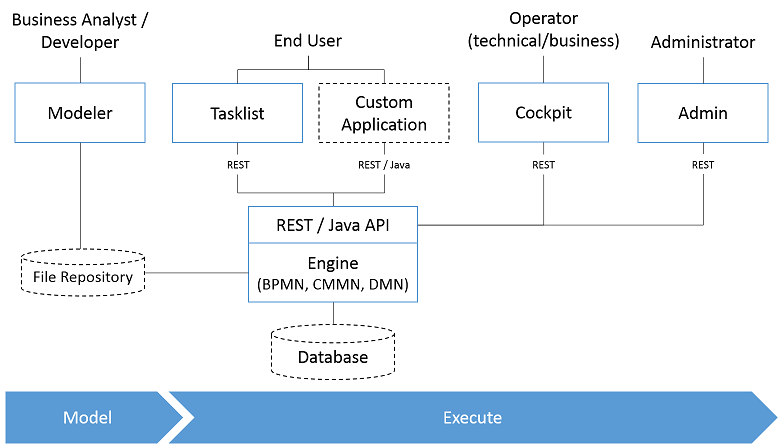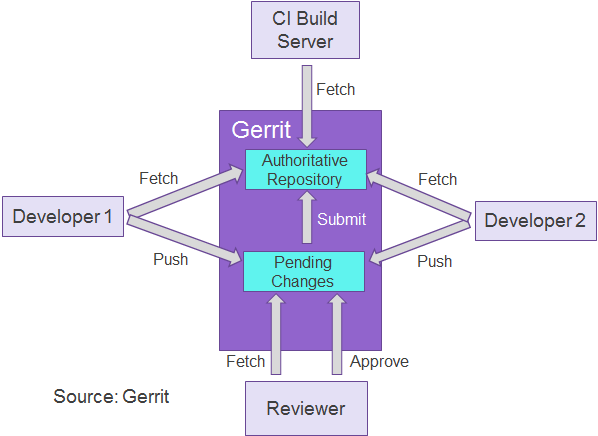PLEASE REFER TO R1 NETWORK CLOUD RELEASE DOCUMENTATION
NC Family Documentation - Release 1
THIS DOCUMENTATION WILL BE ARCHIVED
Contents
Airship
A collection of inter-operable and loosely coupled open source tools that provide automated cloud provisioning and management in a declarative way.
Airship helps operators take control of their infrastructure, by providing a declarative framework for defining and managing the life cycle of open infrastructure tools and the hardware below. These tools include OpenStack for Virtual Machines, Kubernetes for container orchestration, and MaaS for bare metal, with support for OpenStack Ironic on the way.
Read the documentation.
Calico
Read the Version 1.6 documentation.
Source: Calico
Camunda
A light-weight, open-source platform for Business Process Management.
Camunda is a Java-based framework supporting BPMN (Business Process Model and Notation) for workflow and process automation.
The following figure shows the most important components:
Ceph
A unified, distributed storage system designed for performance, reliability and scalability.
Ceph delivers object, block, and file storage in one unified system.
Read the documentation.
Source: Ceph
CNI
Container Network Interface (CNI), a Cloud Native Computing Foundation project.
CNI consists of a specification and libraries for writing plugins to configure network interfaces in Linux containers, along with a number of supported plugins. CNI concerns itself only with network connectivity of containers and removing allocated resources when the container is deleted. Because of this focus, CNI has a wide range of support and the specification is simple to implement.
Source: Cloud Native Computing Foundation Project.
Gerrit
Gerrit is used for code review. Gerrit is built using the secure postsql db utility. It allows developers to push code into a legitimate vault, where it can be reviewed, and deployed into the production environment. Gerrit also fully synchronizes with git.
Jenkins
A Jenkins container automates the CI process. This container contains the necessary Gerrit and Nexus plugins to build jobs that will run unit tests, execute static source code analysis, and deploy build artifacts to Nexus.
JIRA
JIRA tracks Akraino code, feature, and overall project-related issues, affording the opportunity for users to report issues in a timely manner and track their resolution per agreed timelines.
Kubernetes
(Commonly stylized as K8s) An open-source system for automating deployment, scaling, and management of containerized applications.
Kubernetes groups containers that make up an application into logical units for easy management and discovery. Kubernetes provides a container-centric management environment. It orchestrates computing, networking, and storage infrastructure on behalf of user workloads.
Read the documentation.
Source: Kubernetes
Nexus 3
Nexus 3 supports both repositories and containers. It is integrated with Jenkins, publishing both artifacts and Docker containers. The Maven build uses Nexus 3 as a proxy repository for third party libraries. Afterward, built and packaged artifacts are posted in the Nexus release repository for downloading.
ONAP
Open Networking Automation Platform (ONAP), a comprehensive platform for real-time, policy-driven orchestration and automation of physical and virtual network functions.
ONAP will enable software, network, IT and cloud providers and developers to rapidly automate new services and support complete life-cycle management.
Source: ONAP
OpenStack
Open source software for creating private and public clouds.
Read the documentation.
OVS-DPDK
Open vSwitch with Data Plane Development Kit (OVS-DPDK), a high performance open source virtual switch.
Open vSwitch is a multi-layer virtual switch licensed under the open source Apache* 2.0 license. It supports SDN control semantics via the OpenFlow* protocol and its OVSDB management interface. It is available from openvswitch.org, GitHub, and is also consumable through Linux distributions. DPDK is a set of user space libraries that enable a user to create optimized performant packet processing applications (information available at DPDK.org). In practice, it offers a series of Poll Mode Drivers (PMDs), which enable direct transferral of packets between user space and the physical interface, bypassing the kernel network stack.
Source: Intel
SR-IOV
The single root I/O virtualization (SR-IOV) interface is an extension to the PCI Express (PCIe) specification. SR-IOV allows a device, such as a network adapter, to separate access to its resources among various PCIe hardware functions.
Tempest
This is a set of integration tests to be run against a live OpenStack cluster. Tempest has batteries of tests for OpenStack API validation, scenarios, and other specific tests useful in validating an OpenStack deployment.
Source: Github
Read the Documentation

